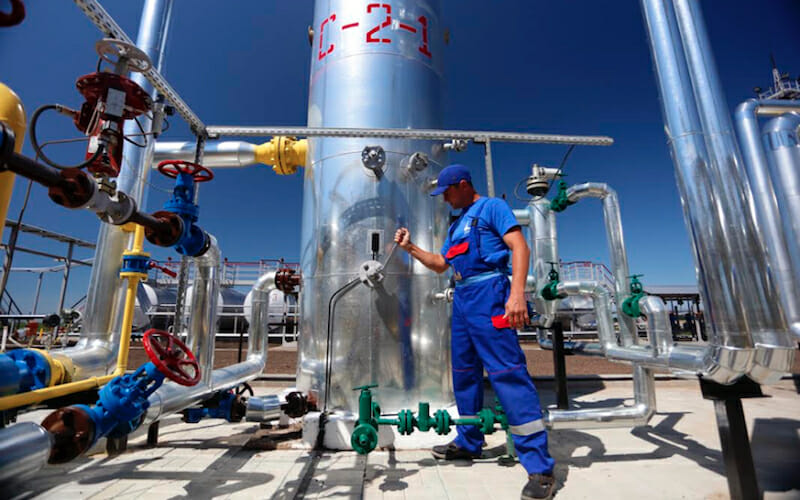
Burisma Offers Hope for Ukraine’s Energy Independence
Energy security is a strategic asset. It helps countries function efficiently, but also elevates and lowers certain states, serving as one of the single biggest reasons for disputes and conflict and for emerging economies, this is even more so.
Ukraine is a shining example. Amid a long drawn-out conflict with Russia that started in 2014, it is slowly forging a path to energy security, and finding out just how hard that can be.
After 70 years as part of the Soviet Union and another two decades of inequitable energy dealings benefiting the few, the country is still struggling to establish energy self-sufficiency.
Energy dependency is a big part of the problem
Russia was historically Ukraine’s leading energy supplier, even though the country has Europe’s third-largest shale gas reserves estimated at 1.2 trillion cubic meters (tcm).
Natural gas is the main energy supply in Ukraine which previously purchased up to 60 percent of its supplies from Russia.
That gas was virtually limitless and heavily subsidized, but there were conditions. For decades, Ukraine’s leaders were meant to curry favor with the Kremlin and bend to its political will. Corruption was endemic and, in the end, Ukrainians decided that the price was too high.
In November 2013, mass protests began in Ukraine when then-President Viktor Yanukovych suspended its preparations for an EU association agreement in favor of a financial package from Russia. After his forced ouster by protesters in February 2014, unrest ensued in the country’s largely Russo-phone regions. As the crisis spread, Russia sent troops into Crimea, annexing it that March. A war broke out in eastern Ukraine soon after backed by Russian insurgents. Today, the death toll exceeds 10,000, with the number of casualties rising amidst a fragile ceasefire.
In November 2015, Ukraine’s state energy company, Naftogaz, curtailed Russian gas imports in a bid to wean the country off of its energy dependence on Moscow. However, it continues to hold an effective monopoly on imports, leading to constant price hikes and struggling industry.
Ukraine sets its sights on energy independence
It is becoming increasingly clear to the Ukrainian government that the country must mine and manage its own energy resources to become self-sufficient, a task which it is slowly warming up to.
But it cannot succeed alone and has so far failed to secure support from foreign investors given the harsh barriers to doing business in the country, namely, excess bureaucracy and corruption.
As of today, Ukraine produces 30 percent of its natural gas consumption, but it must look to alternatives. If it can organize a concerted mining effort, then it could deliver gas to its consumers at a cheaper rate and exercise its own political and economic sovereignty.
But this will only be feasible with the rise of private energy producers.
Burisma Group, one of Ukraine’s largest private companies, has been working to promote the country’s energy security inside and outside its borders in parallel with the state’s own efforts, most recently by launching the import of large volumes of gas from Europe in August 2017.
Who is the Burisma Group?
Burisma is arguably the largest private company on the Ukrainian gas market and the leading natural gas producer in Ukraine.
Founded by entrepreneur and former politician Mikola Zlochevsky, it is the first and, so far, only fully-integrated gas operator in the country performing exploration, production, processing, transport and final sale.
Burisma has 35 production licenses for hydrocarbon production in all of the main oil and gas basins in Ukraine. They include the Dnieper-Donetsk basin, which sits in eastern Ukraine and has for decades provided a vast amount of fossil fuels including coal, oil and now gas. The Carpathian basin is another rich resource that the company hopes to exploit.
Burisma’s role in Ukraine’s gas sector
Burisma has maintained its position at the head of the gas production industry in Ukraine with a series of large investments. It has also made technical breakthroughs with seismic and drilling techniques that have nearly doubled its 2014 annual yield of 692 mcm within just two years.
In 2016, the company produced more than 1 billion cubic meters (bcm) of gas, or 5 percent of Ukraine’s total 20.1 bcm output in 2016. As for private sector gas production, 20 percent of its 4.1 bcm belongs to Burisma, and the company sees further prospects for additional growth.
“We are continuously investing in the development of new wells and contributing to Ukraine’s energy independence,” Vadym Pozharskyi, an advisor to the board of directors at Burisma Group, said.
It is an important milestone, as private producers managed just 2.0 bcm in 2009 and 2.1 bcm in 2010.
“This is an industry that simply cannot make an impact unless private companies take the lead,” he said. “Investment and innovation will follow in kind. It is no easy task, but we are working to be a key force in modernizing the energy sector – and in urging other private firms to do so.”
Could Ukraine become a net producer of gas?
A series of deals could even turn Ukraine into a net exporter of gas to other European nations in the future. It has the natural resources, but getting them out of the ground and to consumers is a Herculean task.
This year, Burisma launched the most powerful oil rig in the country with a deadweight of 680 metric tons. The rig was made by the U.S.company, Service King Manufacturing Inc. and can drill gas-wells down to 10,000 meters.
Lead executive director of operations in Ukraine, Taras Burdeiniy, said this new equipment will help Burisma dig 20 new wells in 2017. This will provide a vast amount of increased output and build toward Ukraine’s energy security plan. The company has publicly stated its target of 1.5 bcm in 2017.
Burisma is also lobbying the Ukrainian government to improve licensing transparency, which should make for a better business environment that attracts more foreign direct investment.
Private producers will drive competition
Private producers will undoubtedly drive the market in Ukraine in coming years, which will create competition and reduce the price for the end user.
Pozharskyi said this positive trend can only continue with meaningful support from the Ukraine’s central and regional government offices.
“Greater coordination between the private sector, state-owned energy firms, government and the international community can make Ukrainian energy independence a reality,” he said.
Advisor to Burisma’s board: ‘U.S. investment and support is crucial’
Burisma invited on to its board former Polish President Aleksander Kwasniewski, Hunter Biden, a U.S. attorney and the son of former U.S. Vice President Joe Biden, and former Director of the CIA’s Counter Terrorist Center Joseph Cofer Black.
Pozharskyi said these additions were a statement of intent.
“This strengthens Ukraine’s ties to global political and economic leaders and helps us set a clear agenda to champion domestic causes and actively campaign against Russian influence,” he said.
In January 2017, Burisma also began to build bridges with the international academic and policy community by signing a cooperative agreement with the Atlantic Council to develop programs to boost transatlantic relations, while also focusing on energy security and related issues.
Working with the EU community for sake of energy security
Burisma’s focus on Ukraine’s energy security has expanded outside the country’s borders, and taken on a new international perspective.
In 2014, the company founded the annual Energy Security Forum in Monaco, in partnership with the Prince Albert II of Monaco Foundation and Foundation Amicus Europae. Keynote speakers include former German Vice-Chancellor Joschka Fischer, former EU Commissioner for Energy Andris Piebalgs and former U.S. Deputy U.S. Secretary of Energy TJ Glauthier.
The event has blossomed into one of the world’s largest public diplomacy vehicles aimed at raising awareness of energy security and incorporating renewable energy into the global mix.
Pozharskyi said the forum is an unprecedented venue that unites leaders of all stripes behind the idea of European energy independence.
“We created this forum to serve as a platform for sharing and discussing ideas that will result in comprehensive, long-term work to shape a new strategy for energy security,” he said. “One of our key messages to the world is that the private sector – not just in Ukraine but in other countries – must take the lead to spur economic growth and ensure energy self-sufficiency.”
In doing so, Burisma is also showing the international community that Ukraine’s private sector sees its future in the EU. It is also demonstrating that the private sector can stimulate growth and transparency – a process usually seen as the domain of the state in the post-Soviet space.
Despite the serious economic and strategic issues facing Ukraine now and in the foreseeable future, it does have the ability to become a model of development worthy of emulation. But it will require successful joint efforts by the government and private business to get there.
